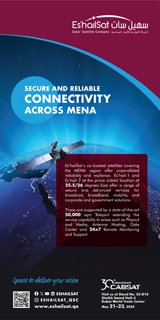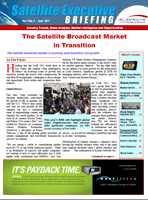Advancing Key GVF Collaborative Issues at IBC and Comsys VSAT 2011
by Martin Jarrold
London, September 2, 2011-- Signaling the drawing to a close of the northern hemisphere summer, two major events on the satellite industry calendar, which regularly bring together significant numbers of industry representatives to Europe in early September, will additionally feature gatherings that will focus on initiatives in which GVF, together with key industry, and other, partners, is taking the lead.
September 9thto 13thsees the City of Amsterdam once again welcoming attendees to the IBC Exhibition & Conference, and this year a key discussion agenda item for the satellite industry will be set at a September 8thpre-show summit, the International Satellite Industry Forum on ‘Interference – The Counter Offensive’.
In organizing this event with the Satellite Interference Reduction Group (sIRG), and in coordination with the Radio Frequency Interference-End Users Initiative (RFI-EUI), and the World Broadcasting Unions-International Satellite Operations Group (WBU-ISOG), GVF’s objective is to consolidate and extend upon the several years of concerted collaboration between broadcasters and satellite industry leaders to combat satellite radio frequency interference (RFI) throughout the world.
In generously hosting the summit, Eutelsat is also aiding this collective effort to examine a number of fundamental interference-related questions, such as: What results have been achieved over these years? What challenges remain to be addressed? And what is required to address those outstanding challenges? Seeking the answers to these questions, and contributing to the focused high-level dialog, will be executives covering the full spectrum of the satellite industry. The satellite industry associations, GVF and sIRG, will be joined by the voice of the broadcasting sector, the WBU-ISOG, and a relatively new group, the RFI-EUI, and now established are three collaborative working groups, with representation from all the above mentioned organizations. The goals of each of these three working groups will develop plans designed to take quality assurance and satellite signal integrity to the next level.
Such plans are critical because continuing interference is still causing service interruptions, leading to increasing operational costs, decreasing reliability rates, and impacting industry competitiveness. Broadcasters' and satellite industry efforts to solve RFI problems have been extensive, but the adoption of viable solutions and their comprehensive implementation has yet to be achieved and there is now a heightened urgency to yield results.
So, what needs to be done now? The summit will discuss the following key measures:
· Carrier ID must be implemented in time for the Olympic Games in London in 2012;
· Operators need to uphold and enforce product-quality-assurance measures;
· The training of technicians and SNG operators should become a requirement;
· Satellite system operator support for data-sharing through the SDA (Space Data Association) Space Data Centre has to be expanded; and
The foundation of a global consensus on vital spectrum issues related to terrestrial interference should be carried forward at the next International Telecommunication Union World Radiocommunication Conference (WRC-2012).
As the most recent in a series of meetings, held in Europe, North America and Asia, this summit will provide an important opportunity to learn about the latest developments relating to each facet of the RFI issue, to evaluate their relative merits, and to build upon the progress already made to advance towards necessary solutions. If you are interested in attending this event, or to learn more about the initiative contact david.hartshorn@gvf.org.
As the satellite industry adjusts its focus from Amsterdam to London for the Comsys conference VSAT 2011, September 14thto 16th, a further highly-focused topic group will gather at the conclusion of the main event agenda: the GVF Maritime Satcom Forum (MSF).
With the generous cooperation of Comsys, from 1:00pm (BST) on the 16ththe 2011 face-to-face meeting of the GVF
MSF will continue an already established initiative that addresses the growing need for satellite programs in this increasingly important area of global broadband operations.
The agenda for discussion during the MSF meeting will include discussion of:
· Heightening awareness of satellite solutions in the maritime sector;
· Strengthening advocacy efforts in the international regulatory arena;
· Expanding delivery of satcom training for the maritime user community;
· Facilitating new maritime satcom projects; and aReview of the most recent actions undertaken by the MSF related to the above agenda items.
Included in the “Review” portion of the agenda will be a report-back on the proceedings of the Maritime Regulatory Group on such matters as: Countries with restrictive maritime licensing practices; the Radio Spectrum Policy Programme of the EU; Restrictions on C band ESV’s; Interference into Ku band downlinks; Access to the extended Ku band; and Light touch regulation for ESVs.
Membership in the MSF is open to all GVF Members; it is guided by an advisory board with oversight from the GVF Board of Directors and GVF Secretariat. Simon Bull of COMSYS serves as Chairman, aided by myself as GVF Chief of International Program Development.
During the meeting, a buffet luncheon will be provided to pre-registered participants. Interested readers of this column may confirm their participation in advance of the meeting by emailing David Hartshorn at david.hartshorn@gvf.organd/or Liz Grimm at liz.grimm@gvf.org.
------------------------------------------------------
 Martin Jarrold is Director of International Programs of the GVF. He can be reached at: martin.jarrold@gvf.org
Martin Jarrold is Director of International Programs of the GVF. He can be reached at: martin.jarrold@gvf.org





